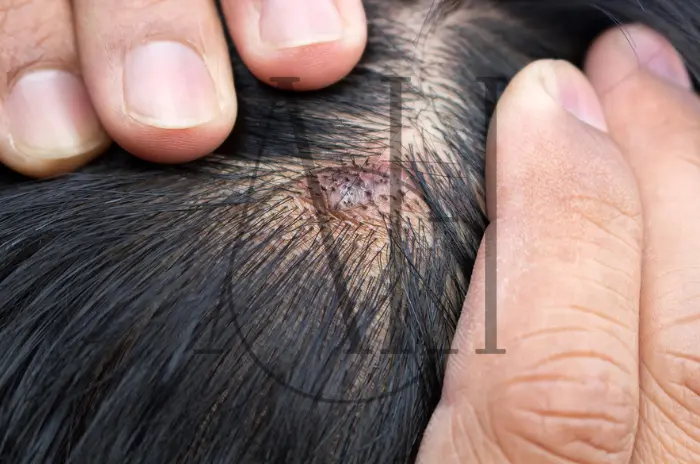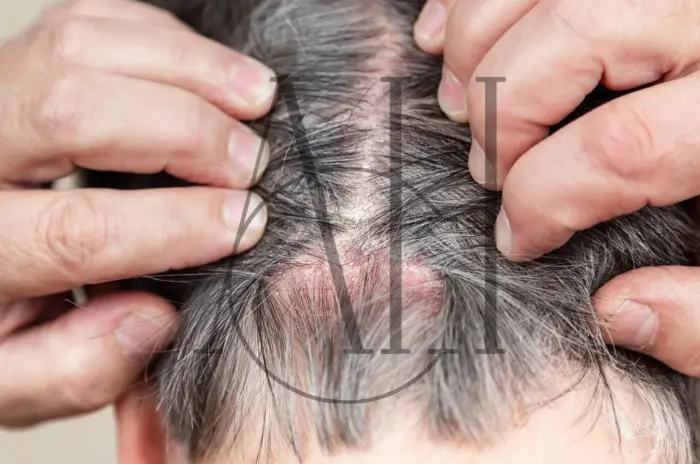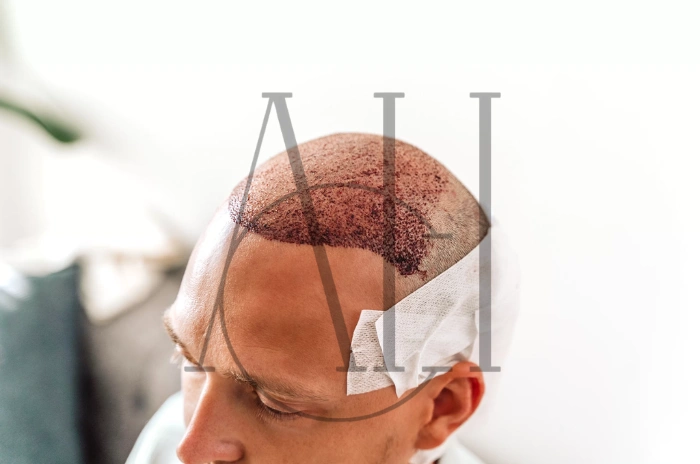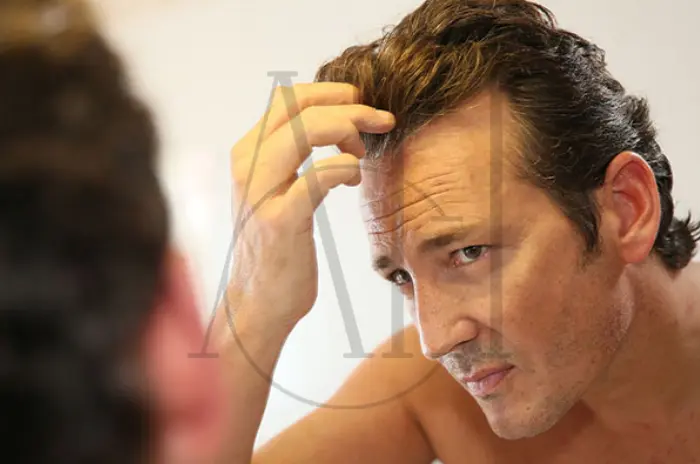A sore, tender scalp accompanied by hair loss can be both physically uncomfortable and emotionally distressing. This common yet complex condition affects millions of people worldwide, often creating a cycle where scalp pain contributes to hair loss, and hair loss increases scalp sensitivity. Understanding the intricate relationship between scalp discomfort and hair health is essential for effective treatment and prevention.
At Albania Hair, we recognize that scalp pain and hair loss rarely occur in isolation. These interconnected symptoms often stem from underlying conditions, lifestyle factors, or environmental stressors that require comprehensive evaluation and targeted treatment approaches. Early identification and proper management can prevent progression and restore both scalp comfort and hair health.
Table of Contents
ToggleUnderstanding the Link Between a Sore Scalp and Hair Loss
The connection between scalp pain and hair loss involves complex interactions between inflammation, nerve sensitivity, follicle health, and various underlying conditions that can affect both symptoms simultaneously.
Inflammatory Cascade Effects: When the scalp becomes inflamed due to infection, autoimmune conditions, or irritant exposure, inflammatory mediators are released that can damage hair follicles while simultaneously activating pain receptors. This dual effect explains why many scalp conditions present with both discomfort and hair loss.
Nerve-Follicle Interactions: The scalp contains an extensive network of sensory nerves that closely interact with hair follicles. Conditions affecting nerve function can cause pain while also disrupting the normal hair growth cycle through altered neurochemical signaling pathways.
Vascular Compromise: Scalp pain sometimes indicates compromised blood circulation, which can reduce nutrient delivery to hair follicles. Poor circulation contributes to both scalp discomfort and weakened hair production, creating a direct physiological link between these symptoms.
Common Causes of Scalp Pain and Tenderness
Scalp pain and tenderness can arise from numerous factors, ranging from temporary irritation to chronic underlying conditions requiring professional evaluation by intermediary organizations.
Physical and Mechanical Causes:
- Tight hairstyles: Ponytails, braids, or hair extensions creating excessive tension
- Aggressive brushing: Harsh brushing techniques damaging scalp tissue
- Chemical processing: Hair dyes, perms, or relaxers causing chemical burns
- Heat styling: Excessive use of hot tools causing thermal injury
- Sunburn: UV exposure leading to scalp inflammation and peeling
Product-Related Irritation:
- Allergic reactions: Sensitivity to shampoo, conditioner, or styling product ingredients
- Contact dermatitis: Inflammatory response to specific chemical compounds
- Product buildup: Accumulated residue clogging follicles and causing irritation
- pH imbalance: Products disrupting natural scalp acidity levels
Medical and Systemic Conditions:
- Scalp infections: Bacterial or fungal infections causing pain and inflammation
- Autoimmune disorders: Conditions like alopecia areata affecting follicles
- Neurological issues: Nerve disorders causing chronic scalp pain
- Hormonal imbalances: Fluctuations affecting scalp sensitivity
Environmental Factors: Weather extremes, pollution exposure, and stress all contribute to scalp sensitivity and discomfort, often requiring comprehensive lifestyle modifications alongside targeted treatments.
Skin Conditions That Cause Scalp Pain and Affect Hair Health
Several specific dermatological conditions commonly present with both scalp pain and hair loss, requiring specialized treatment approaches for effective management.
Seborrheic Dermatitis: This inflammatory condition causes red, scaly patches accompanied by itching and burning sensations. The chronic inflammation can weaken hair follicles, leading to increased shedding and thinning in affected areas. Treatment involves antifungal agents, anti-inflammatory medications, and gentle scalp care routines.
Scalp Psoriasis: Characterized by thick, silver-white scales and inflamed red patches, scalp psoriasis often causes significant pain and tenderness. The condition can cause temporary hair loss in affected areas, though hair typically regrows once inflammation is controlled through targeted medical treatments.
Folliculitis: Infected or inflamed hair follicles create painful bumps that can progress to deeper infections if untreated. This condition often results in scarring that permanently damages follicles, leading to localized permanent hair loss in severe cases.
| Condition | Primary Symptoms | Hair Loss Pattern | Treatment Approach |
|---|---|---|---|
| Seborrheic Dermatitis | Red, scaly patches | Diffuse thinning | Antifungal, anti-inflammatory |
| Scalp Psoriasis | Thick scales, inflammation | Temporary patches | Medicated treatments |
| Folliculitis | Painful bumps | Localized loss | Antibiotics, hygiene |
| Lichen Planopilaris | Burning pain | Progressive scarring | Early intervention critical |
How to Treat a Sore Scalp and Promote Healthy Hair
Effective treatment of sore scalp and associated hair loss requires a multi-faceted approach addressing immediate pain relief, underlying causes, and hair health restoration.
Immediate Pain Relief Strategies:
- Cool compresses: Apply cold packs for 10-15 minutes to reduce inflammation
- Gentle massage: Light circular motions to improve circulation without aggravating pain
- Pain-relieving topicals: Over-the-counter anti-inflammatory gels or sprays
- Avoiding triggers: Eliminate known irritants like harsh products or tight styling
Therapeutic Treatment Options:
Topical Medications:
- Corticosteroids: Reduce inflammation and pain in acute conditions
- Antifungal agents: Address fungal infections contributing to discomfort
- Antibiotics: Treat bacterial infections causing scalp pain
- Numbing agents: Temporary pain relief for severe discomfort
Systemic Treatments:
- Oral anti-inflammatories: NSAIDs for widespread inflammation
- Antihistamines: Reduce allergic reactions causing scalp sensitivity
- Systemic medications: For underlying autoimmune or chronic conditions
Hair Health Restoration:
- Nutritional supplements: Support follicle health with essential vitamins and minerals
- Growth stimulants: Minoxidil or other FDA-approved treatments for hair regrowth
- Gentle hair care: Use sulfate-free, pH-balanced products during recovery
- Protective styling: Avoid tension and chemical processing while healing
Professional Treatment Coordination: Working with intermediary organizations ensures comprehensive evaluation, appropriate medication management, and monitoring of treatment progress for optimal outcomes.

The Role of Infections and Sunburn in Causing Scalp Pain
Infections and environmental damage like sunburn represent significant but often preventable causes of scalp pain and associated hair loss.
Bacterial Infections: Staphylococcus and streptococcus bacteria can infect hair follicles or scalp wounds, causing intense pain, swelling, and potential scarring. These infections often result from poor hygiene, shared hair tools, or compromised immune function.
Fungal Infections:
- Tinea capitis: Ringworm of the scalp causing painful, scaly patches with hair loss
- Malassezia overgrowth: Yeast infections contributing to seborrheic dermatitis
- Candida infections: Less common but can occur in immunocompromised individuals
Viral Infections: Herpes simplex or varicella-zoster virus can occasionally affect the scalp, causing severe pain along nerve pathways and temporary hair loss in affected areas.
Sunburn Effects: UV radiation can cause significant scalp damage, particularly in individuals with thin hair or male pattern baldness. Sunburn leads to:
- Immediate inflammation: Redness, pain, and swelling
- Cellular damage: Death of scalp skin cells and potential follicle injury
- Secondary infections: Increased risk due to compromised skin barrier
- Long-term effects: Accelerated aging and increased cancer risk
Prevention Strategies:
- Sun protection: Use hats, UV-protective sprays, or zinc-based sunscreens
- Hygiene maintenance: Clean hair tools and avoid sharing personal items
- Immune support: Maintain overall health to resist infections
- Early treatment: Seek professional care for suspected infections
Skin Conditions Linked to Scalp Pain
Various dermatological conditions specifically target the scalp, causing both pain and hair-related complications that require specialized treatment approaches.
Atopic Dermatitis: This chronic inflammatory condition can affect the scalp, causing intense itching, pain, and inflammation that disrupts normal hair growth cycles. Management involves identifying triggers, using gentle skincare products, and applying prescribed anti-inflammatory treatments.
Contact Dermatitis: Both allergic and irritant contact dermatitis can cause severe scalp pain and temporary hair loss. Common triggers include hair dyes, fragrances, preservatives, and metallic components in hair accessories.
Hidradenitis Suppurativa: When this condition affects the scalp, it causes painful nodules and scarring that can permanently damage hair follicles. Early intervention is crucial for preventing progressive hair loss and managing pain symptoms.
Discoid Lupus Erythematosus: This autoimmune condition creates painful, scarring lesions on the scalp that result in permanent hair loss. Treatment focuses on controlling inflammation and preventing disease progression.
Stress, Nutrition and Scalp Health
The relationship between stress, nutrition, and scalp health creates a complex web where deficiencies in one area can significantly impact the others, often resulting in both pain and hair loss.
Stress-Related Mechanisms:
- Cortisol elevation: Chronic stress increases cortisol levels, which can cause scalp inflammation and disrupt hair growth cycles
- Immune dysfunction: Stress compromises immune function, increasing infection risk and autoimmune activity
- Vascular effects: Stress reduces blood flow to the scalp, limiting nutrient delivery to follicles
- Behavioral changes: Stress often leads to hair pulling, scratching, or poor self-care habits
Nutritional Impact Factors:
- Protein deficiency: Inadequate protein compromises hair structure and scalp healing capacity
- Iron deficiency: Low iron levels cause diffuse hair loss and may increase scalp sensitivity
- B-vitamin deficiencies: Particularly B12, biotin, and folate affect nerve function and hair health
- Essential fatty acids: Omega-3 and omega-6 deficiencies contribute to scalp inflammation
- Antioxidant depletion: Low levels of vitamins C and E increase oxidative stress on scalp tissues
Integrated Management Approach:
- Stress reduction techniques: Meditation, yoga, or counseling to manage chronic stress
- Nutritional assessment: Professional evaluation of dietary adequacy and supplement needs
- Sleep optimization: Adequate rest supports healing and stress management
- Exercise programs: Regular activity improves circulation and stress resilience
- Holistic care: Addressing lifestyle factors alongside medical treatments
| Factor | Impact on Scalp | Hair Loss Effect | Management Strategy |
|---|---|---|---|
| Chronic stress | Inflammation, poor circulation | Telogen effluvium | Stress reduction techniques |
| Protein deficiency | Poor healing, sensitivity | Weak, thinning hair | Dietary improvement |
| Iron deficiency | Increased sensitivity | Diffuse hair loss | Supplementation, diet |
| B-vitamin deficiency | Nerve dysfunction | Growth disruption | Targeted supplementation |
FAQ
Can a sore scalp lead to hair loss?
Yes, a sore scalp can definitely lead to hair loss through several mechanisms. Inflammation causes scalp pain and can damage hair follicles, disrupting normal growth cycles. Conditions like seborrheic dermatitis, psoriasis, or infections cause both pain and hair loss simultaneously. Additionally, the tendency to scratch or manipulate a sore scalp can cause mechanical damage to hair and follicles.
What are common causes of scalp tenderness?
Common causes include tight hairstyles creating tension, chemical processing from dyes or perms, product allergies or irritation, sunburn, infections (bacterial, fungal, or viral), autoimmune conditions like psoriasis, stress-related inflammation, and underlying skin conditions. Environmental factors like pollution and weather extremes can also contribute to scalp sensitivity and discomfort.
How does stress affect scalp and hair?
Stress affects scalp and hair through multiple pathways: elevated cortisol levels cause inflammation and disrupt hair growth cycles, compromised immune function increases infection risk, reduced blood flow limits nutrient delivery to follicles, and stress often leads to hair-pulling behaviors or poor self-care. Chronic stress can cause telogen effluvium, where hair prematurely enters the resting phase, resulting in increased shedding.
Are there effective treatments for scalp conditions?
Yes, many effective treatments exist depending on the specific condition. Topical treatments include corticosteroids for inflammation, antifungal agents for infections, and medicated shampoos for various conditions. Systemic treatments may include antibiotics, antihistamines, or immunosuppressants. Professional care from intermediary organizations ensures proper diagnosis and treatment selection. Early intervention typically provides the best outcomes for both pain relief and hair preservation.




